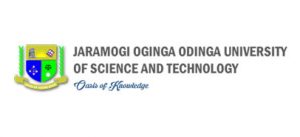
Contact Details
T: 020-2030397, 057-2501804, 020 2069349
C: +254 73 682 1227
Fax +254 20 802 7449
Jaramogi Oginga Odinga University of Science and Technology
Jaramogi Oginga Odinga University of Science and Technology (JOOUST), is a public university in Kenya. It is named after independence leader and Kenya's first Vice-President Jaramogi Oginga Odinga.
JOOUST was founded in 2009, through a Legal Order No. 56 of 11th May 2009, as Bondo University College, established by the Government of Kenya as the then Constituent College of Maseno University. The University was granted a Charter on 13th February 2013 thus gaining a new name as Jaramogi Oginga Odinga University of Science and Technology. The University College started with a small number of 200 students but has since grown its student’s body to 13,265 as at the beginning of 2019.
The University programmes are tailored towards providing students with the relevant competencies, skills, knowledge and integrated understanding of different fields. To contribute to the realization of a knowledge based economy as espoused in the Kenya Vision 2030, the University programmes are anchored on the pillars of scientific research, innovation, collaboration with the industry and technology transfer.
Location and Accessibility
The University’s Main Campus is situated in the town of Bondo, in the western part of Kenya, approximately 65 kilometres, west of the city of Kisumu and 2 Kilometers from the centre of Bondo town along Bondo-Usenge Road within Siaya County, Kenya. JOOUST is strategically located near Lake Victoria, the World’s second largest fresh water lake; an endowment that bestows upon the University the fairly exclusive serene environment with a high potential for studies in fresh water science and natural resource management.
The location of the University is not only friendly for the pursuit of academic excellence and scholarship but also suitable for high prolific research undertakings as well as community outreach and innovation.
Niche Areas
The Ministry of Education (MOE) recognizes JOOUST as a science and technology institution. This recognition is based on the University’s strategic objectives, its administrative structures as well as physical facilities. Based on this, the University has identified the potential areas to develop as its niche. These include agriculture, food and nutrition security, fresh water sciences, engineering and renewable energy.
The University has established relevant Schools to address specific disciplines of agriculture and food sciences, engineering and technology, spatial planning and natural resource development, health sciences among others. Through these schools, the University is spearheading the development of its niche in Food Security.
To augment its research and training capacity, the University has established the Africa Centre of Excellence (ACE) in Sustainable Use of Insect as Food and Feeds (INSEFOODS). This Centre is one of the twenty-four (24) East and Central Africa Regional Centers that are currently funded by the World Bank to build capacity for the region in various disciplines. The overall objective of INSEFOODS is to address challenges of sustainable food security using insects as human food and animal feed. This is done through training, infrastructure development and conducting research and extension services for local communities. In addition, the Centre aims to build sustainable local, regional and international partnerships and networks for research in the relevant area of food security. Generally, the programs under the School and at INSEFOODS address the UN Sustainable Development Goals, African Union Agenda 2063 and the Social and Economic Pillars under the Kenyan Vision 2030.
The University has also established the Directorate of Lacustrine and Blue Ocean Economy Studies and Pii Global Institute. The University plans to conduct research, innovation, develop training and outreach programs taking comparative advantage of being located in the Lake Victoria Basin. Research activities and commercial interests of the University will be more focused in Lake Victoria resources through lacustrine economy.
